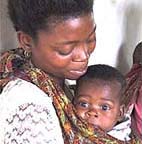|
||||

| |
|||
Malaria causes some 300 million cases of disease
and kills about 1.1 million people a year, most of them young children
in sub-Saharan Africa. It is caused by Plasmodium
parasites spread by the bites of infected mosquitoes. The direct
costs alone of malaria in sub-Saharan Africa have been estimated
at $500 million per year. Although there are numerous drugs that
can be effective against malaria, their power is being steadily
diminished as the parasites develop resistance to them. Malaria is undergoing a resurgence as a result
of various social and environmental changes, including population
movements, health system failure, breakdown in control efforts and,
possibly, global warming. Despite decades of research, no vaccine
has yet been licensed for malaria, despite several promising leads.
Analyses of research spending suggest that malaria
vaccines have been relatively neglected. Despite a recent increase,
overall malaria research spending worldwide totals only about $100
million, out of a total of around $56 billion spent on all biomedical
research. For more information see the Malaria section of the website of of the UNDP- World Bank-WHO Special Programme for Research and Training in Tropical Diseases (TDR): http://www.who.int/tdr/diseases/malaria/default.htm More vaccines for which research is needed
|
|||
|
Contact GAVI | Guestbook | Text version | Credits and Copyright |
|||

